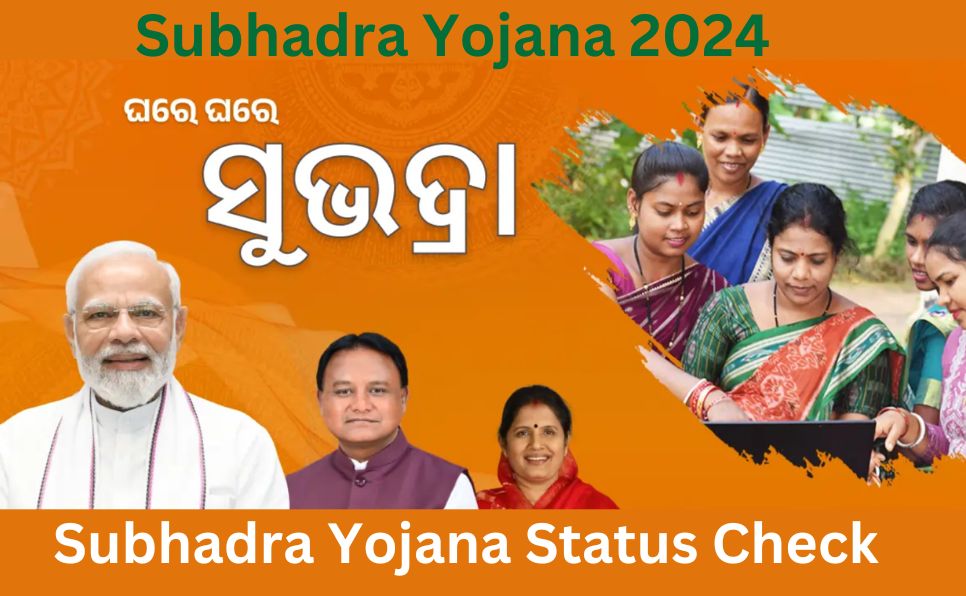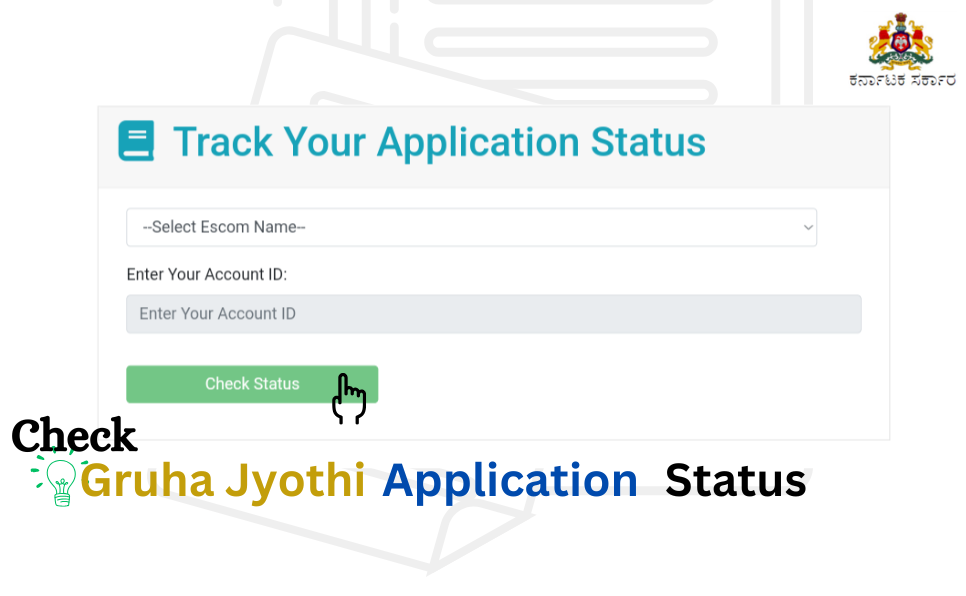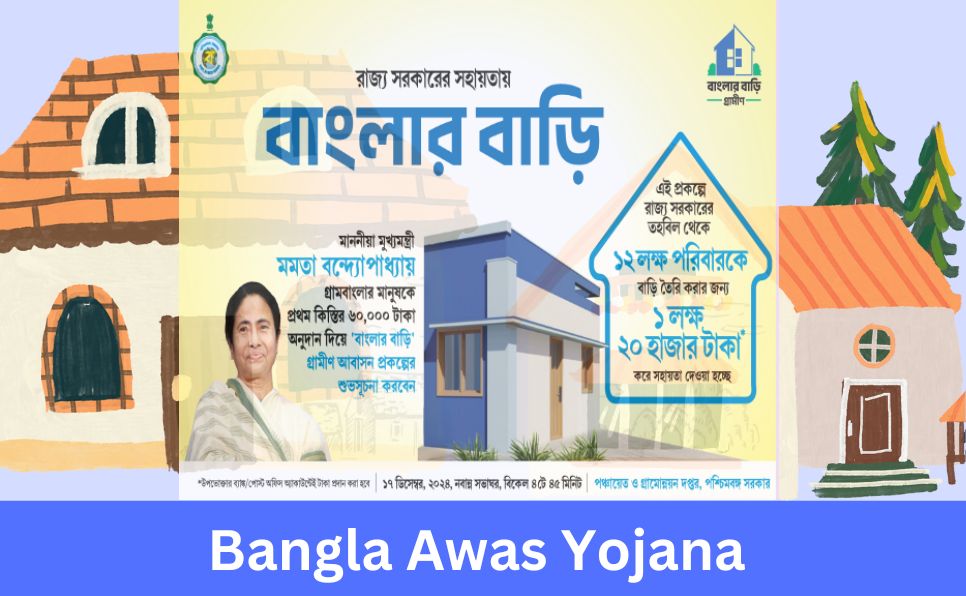The Mangla Pashu Bima Yojana is a revolutionary initiative introduced by the Rajasthan government to ensure financial security for livestock owners in the state.
This scheme, aimed at providing insurance coverage for valuable livestock, not only supports farmers and herders during times of distress but also encourages the adoption of better animal husbandry practices.
With a substantial budget allocation and an easy application process, this scheme is set to transform the lives of livestock owners across Rajasthan.
What is Mangla Pashu Bima Yojana?
The Mangla Pashu Bima Yojana, announced in the Rajasthan Budget 2024-25, is a livestock insurance scheme that covers dairy cows, buffaloes, camels, sheep, and goats.
Under this scheme, the state government has proposed to insure up to 5 lakh dairy cows/buffaloes, 5 lakh sheep/goats, and 1 lakh camels.
The initiative aims to mitigate financial risks associated with the accidental death of livestock, ensuring economic stability for farmers and herders.
Overview of Mangla Pashu Bima Yojana
| Scheme Name | Mukhyamantri Mangla Pashu Bima Yojana |
| State | Rajasthan |
| Announced By | Deputy CM Divya Kumari |
| Date of Announcement | 10 July 2024 |
| Application Start Date | 13 December 2024 |
| Application End Date | 12 January 2025 |
| Objective | To provide insurance coverage for livestock |
| Beneficiaries | Farmers and herders of Rajasthan |
| Budget Allocation | ₹400 crore |
| Application Mode | Online |
| Helpline Number | 0141-2742709 |
Mangla Pashu Bima Yojana Application Process
Applicants can apply online by visiting the nearest e-Mitra kiosk or directly from their own e-Mitra account.
Fees for Mukhyamantri Mangla Pashu Bima is Rs. 50/- . Fees can be paid through the e-Mitra account.
To apply online for Mangla Pashu Bima Yojana follow these steps:
- Visit the official website for the scheme.
- Click on the “Registration” button to access the registration form.
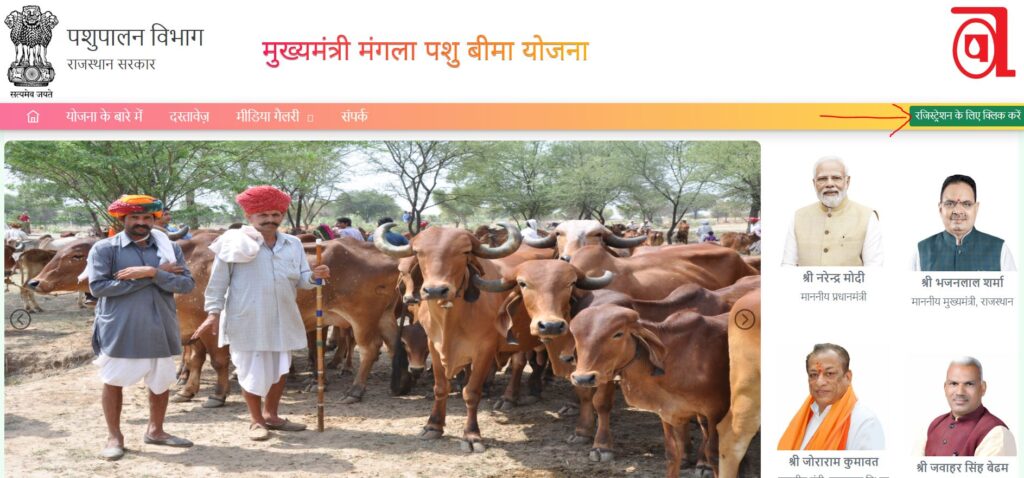
- Agree to the terms and conditions by ticking the checkbox to use your Jan Aadhar number.
- Enter your Jan Aadhar number and click on “Fetch Details.”
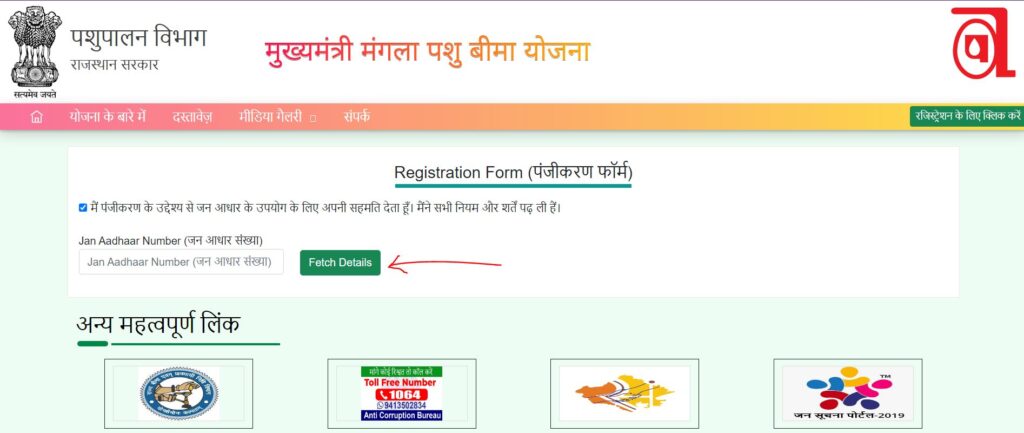
- Fill out the registration form with accurate information.
- Attach the required documents.
- Pay the nominal fee of ₹50 through the e-Mitra portal.
- Submit the form and retain the acknowledgement receipt for future reference.
Also Read: Vidya Sambal Yojana in Rajasthan: Apply for guest faculty in schools and Colleges
Eligibility
General Eligibility:
- All livestock owners in Rajasthan with a valid Jan Aadhar card are eligible.
- Applications must be submitted via the official insurance department website.
Priority Beneficiaries:
- Livestock owners holding a Gopal Credit Card.
- Members of the “Lakhpati Didi” group will receive first preference.
Tagging Requirement:
- Only tagged livestock can be registered for insurance under this scheme.
- Livestock owners with untagged animals must get their animals tagged before applying.
Coverage Limitations:
- Eligible livestock includes:
- A maximum of 2 dairy cows or 2 dairy buffaloes, or
- 1 dairy cow and 1 dairy buffalo, or
- 10 goats, or
- 10 sheep, or
- 1 camel.
- Animals previously insured under other schemes are not eligible.
Type of Livestock Covered:
- Indigenous or hybrid dairy animals like cows and buffaloes.
- Pack animals like camels.
- Small ruminants such as goats and sheep.
Insurance Period:
- Livestock will be insured for one year under the scheme.
Special Provisions:
- Sheep and goats are considered a single unit of 10 animals.
- In cases where fewer than 10 sheep or goats are owned, the available number will still be eligible for insurance.
District-Level Targets:
- Insurance targets are allocated to districts based on the number of livestock.
- Provisions are made to reallocate targets quarterly if initial district quotas are unmet.
Reserved Quotas:
- 16% of the insurance target is reserved for Scheduled Caste livestock owners.
- 12% of the insurance target is reserved for Scheduled Tribe livestock owners.
- If these quotas remain unfilled, other categories of livestock owners may benefit.
Animal Valuation:
- Valuation is based on the health, milk production capacity, age, pregnancy status, and breed of the animal.
- The maximum insurable value for a single livestock unit is ₹40,000.
Livestock Eligibility Assessment
| Livestock Type | Eligible Age for Insurance |
| Dairy Cow | 3 to 12 years |
| Dairy Buffalo | 4 to 12 years |
| Female Goat | 1 to 6 years |
| Female Sheep | 1 to 6 years |
| Camel (Male/Female) | 2 to 15 years |
Insurance Valuation
| Livestock Type | Insurance Valuation Criteria |
| Dairy Cow | ₹3000 per liter/day milk yield (minimum), up to ₹40,000 per animal |
| Dairy Buffalo | ₹4000 per liter/day milk yield (minimum), up to ₹40,000 per animal |
| Female Goat | Maximum ₹4000 per animal |
| Female Sheep | Maximum ₹4000 per animal |
| Camel (Male/Female) | Maximum ₹40,000 per animal |
Documents Required
Applicants must provide the following documents to apply for the scheme:
- Jan Aadhar Card
- Identity Proof (e.g., Voter ID, PAN Card)
- Income Certificate
- Photographs of the livestock
- Applicant’s passport-sized photograph
- Bank account details (Passbook)
- Proof of residence
- Land ownership documents (if applicable)
FAQs
1. What is the purpose of the Mangla Pashu Bima Yojana?
The scheme aims to provide financial security to livestock owners in Rajasthan by insuring their animals against accidental death.
2. What types of livestock are covered under this scheme?
The scheme covers dairy cows, buffaloes, camels, sheep, and goats.
3. How much insurance coverage is provided?
- ₹5-5 lakh for dairy cows and buffaloes.
- ₹1 lakh for camels.
- ₹4000 per sheep/goat.
4. Can I apply for the scheme online?
Yes, you can apply online through the official website or e-Mitra portal.
5. Is there a fee for the application?
Yes, applicants must pay a nominal fee of ₹50 via the e-Mitra portal.
6. What is the deadline for registration?
The application process is open from 13 December 2024 to 12 January 2025.
7. How will the claim process work in case of livestock death?
In case of the death of insured livestock, the owner must:
- Visit the nearest veterinary department office.
- Fill out the claim form and attach the necessary documents.
- Submit the form for verification.
- After approval, the claim amount will be transferred to the owner’s bank account.
For more yojana related updates keep visiting Vikas Yojna.

Vikas Kumar holds an MA in Political Science and has a strong background in government projects, having worked on various contractual initiatives aimed at public welfare. He created this website to share essential updates on government schemes, aiming to empower citizens with the information they need to access valuable resources.


